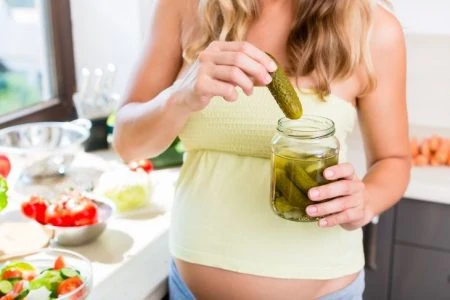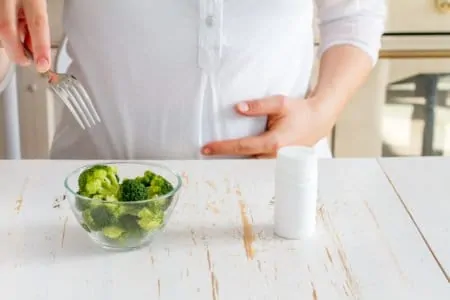When it comes to pregnancy and food, you might feel like the human design is a cruel joke. We feel bloated and gassy, yet we just want to eat.
We constantly feel sick, but we’re expected to eat calorie-dense, nutrient-dense foods for our growing baby. We want to eat a pile of sugary cookies, but we need to eat a healthy salad with some protein and a piece of fruit.
And then there are the cravings. Why do I want to eat nothing but blueberries all day? Is this good for my baby? Is it bad?
Well, it’s time to put your mind at ease. Here is everything you need to know about pregnancy cravings and aversions, including why you have cravings, when you should give in, what you should avoid, and much more.
Key Takeaways
- Pregnancy cravings are when a woman starts wanting to taste or smell something specific, usually a food item.
- Pregnancy cravings are normal and can start at any point during pregnancy.
- Aversions to certain foods can also occur during pregnancy.
- The cause of cravings and aversions can be from a need for a specific nutrient, a need for calories, or an emotional need.
- Cravings and aversions are individual and should be treated sensibly.
What Is a Pregnancy Craving?
A pregnancy craving is when you start wanting to taste or smell something specific. Most of the time, it will be a food item that you crave, and generally, these will be fairly normal foods and combinations.
However, most pregnant women experience at least a few odd cravings. And some women even experience a craving for something that isn’t food at all! When it’s for the taste or texture of a non-food item, this is called pica.
Another symptom of pica is when you crave the smell of a non-food item — this experience is also very common.
When Do Cravings Start and Stop?
The sensation of extreme hunger can begin at any point during pregnancy and may not go away. But specific cravings, especially the weirder ones, usually start near in the second trimester and progress into the third before waning (1).
Around halfway through your pregnancy is when they will be at their most intense, and generally, they will fade away from there. Sometimes your cravings will not completely go away.
Some women find they start craving a specific food during pregnancy and then carry on loving it after birth and for the rest of their lives. This may be psychological, related to the positive, comforting feelings associated with that food.
Why Do I Crave These Foods?
People used to believe that cravings came from a need for that specific food. A whole range of old wives’ tales say a specific craving determines your child’s sex, appearance, or personality your child will have.
Now we understand that cravings can come from a need for a specific nutrient, a need for calories in general, or even an emotional need. But that doesn’t mean your cravings are wrong or you should ignore them.
It just means our understanding of cravings was wrong.
Just Remember
Sometimes You Get the Opposite of a Craving
The opposite of a craving is an aversion. Most women will experience some sort of aversion when they are pregnant.
Usually, aversions focus on animal products, fermented foods (other than vinegar pickles), sticky or runny foods, spicy foods, or foods with strong tastes. It’s not clear-cut, though.
Some women crave these foods, and some women have aversions to simple things like oranges or potatoes. It’s all individual.
Why Do I Have an Aversion To Something?
Food aversions do not come from the same place as cravings. A food craving is a strong desire for a food, usually triggered by a need for nourishment, hormonal shift, or desire for comfort foods.
Aversions tend to be triggered by an oversensitive sense of disgust. So the foods you have an aversion to are probably foods that are risky in the wild, such as meats or foods you have personally had a bad experience with (2).
Nothing was more confusing than the day I was cooking my favorite dish of chicken and peppers when, all of a sudden, I was repulsed. I couldn’t eat that or avocados until about six months after I had my kids!
Editor's Note:
Mary Sweeney, BSN, RN, CENI Don’t Feel Like Eating Anything
Sometimes you can have a different problem entirely. You aren’t loving one food and hating another.
Instead, everything seems pretty, “meh.” This can also happen as a consequence of changing nutritional needs or because your sense of smell and taste are affected by hormones.
If everything tastes pretty plain and bland, it is no surprise if you don’t feel up to it.
In the first trimester, most women also experience nausea. Some women experience nausea during their entire pregnancy.
Again, this is due to hormonal fluctuations and could put you off eating. Fortunately, most nausea does not last all day, and most women who get nausea find that it fades away after the first trimester.
Hang In There
Are Cravings Making Me Eat Too Little?
That is possible too. Many women report craving sweet foods, like cakes, candies, and fruit during pregnancy.
And this might be okay, but if you are used to a diet high in fat and protein, then all these carbs may not add up to enough calories. What’s more, if you are just eating sweet and savory carbs, you may be missing out on a wide range of vital nutrients.
So make sure to eat a varied diet, full of fresh fruits and vegetables, even if all you’re craving is cookies.
Many women also find that eating plain or lightly salted foods can help keep nausea and aversions under control. Some plain drinks, such as almond milk, can also help relieve heartburn, indigestion, and reflux, allowing you to eat better at mealtimes.
Are Cravings About The Food I Need?
Some research suggests cravings are connected to nutrients we need from the food we are craving. So you don’t need chocolate, you just need magnesium, and you don’t need chickpeas; you just need protein.
The specific cravings are just directing us toward foods that are a rich source of these nutrients and easy for us to digest (3).
Other research says cravings are completely meaningless. Some researchers have tried and failed to find any connection between dietary or blood deficiencies and the foods pregnant women crave.
They feel it is more a psychological desire for good or forbidden food and a craving for comfort foods and calories (4).
Will It Hurt To Give In to Cravings?
Whether cravings turn out to be a need for nourishment or comfort, the real question is whether we are craving the right foods.
- Green Light Foods: If the foods you are craving are healthy during pregnancy, such as fruits and vegetables or whole grains, they get the green light. They will do you good.
- Yellow Light Foods: If the foods you are craving are neutral, good for you in small amounts but bad for you in large amounts, such as nuts and seeds or chocolate, then have a small portion of around 50 to 100 calories. This will help you emotionally without encouraging you to overeat.
- Red Light Foods: If the foods you are craving are actively bad for your baby, then it doesn’t matter if they have micronutrients or make you feel great. You need to avoid them and consider alternatives that satisfy your nutritional and emotional needs.
Are Cravings Making Me Overeat?
It’s possible. Because a lot of our cravings are emotional or for highly caloric foods, we can end up eating much more than we need.
For this reason, it’s important to try to keep our snacks small and to be aware of the calories in the food we are eating. You will probably not need any more calories than usual for the first trimester, and for the next two, you will only need a teeny bit more.
Keep An Eye On The Scale
Am I Craving Dangerous Food?
Some foods we crave when pregnant are actively dangerous.
No matter how much you are craving them, you want to avoid:
- Shellfish and raw fish, which can have high levels of bacteria.
- Paté and soft cheeses, which are also likely to carry bacteria.
- Large fish like tuna and swordfish, which are high in mercury.
- Unwashed, unpeeled fruit, which can be coated with pesticides or protective waxes.
- Alcohol and fermented products that may contain alcohol, which can transfer to the baby.
- Licorice, which makes the stress hormone cortisol transfer through the placenta.
- Unfermented or poorly processed soy products, which can affect some women’s hormonal balance.
- Highly salted products, which can cause hypertension in vulnerable women.
Extreme cases of pica are, of course, very dangerous. If you are craving non-food items that are not just bulk — like paper or banana peels — but are actively toxic — such as soap or furniture polish — you need to speak to your doctor.
It’s possible you’re at risk of a nutrient deficiency, poisoning, or even postpartum mental health conditions such as depression (5).
Pica in pregnancy isn’t very common, but don’t be embarrassed to talk to your doctor if you are experiencing this symptom.
What Can I Do To Reduce Cravings?
When it comes to cravings, generally, there is not much you can do about them. You will continue to crave the food until you eat it or until another craving comes along.
If you find you are craving highly caloric foods, you may want to consider eating teeny tiny portions of them or making low-calorie versions with healthier substitutes.
Try To Take Your Mind Off It
They often go away on their own, so just being distracted until the craving fades is all it takes.
If you are experiencing pica, there is a chance you are suffering from a deficiency (like anemia), especially if your pica is recurring. Talk to your doctor about your diet, and you might have some blood tests done.
This will show if you need to change your diet or take supplements.
What Are The Healthiest Substitutes for Cravings?
When it comes to unhealthy cravings, they can be anything from ordinary foods we are not allowed when pregnant to calorie bombs to things that are literally poisonous.
So what do we do when we are craving foods we definitely should not be eating? We make swaps, of course!
- Try swapping sweet chocolates for dark chocolates or sugar-free chocolate-flavored almond milk.
- Swap coffee and tea for doctor-approved spice and herbal teas.
- Swap candy for fruits or sugar-free candy.
- Swap licorice for spiced candy like cinnamon candy.
- Swap plain soy for fermented soy, for example, tofu for tempeh.
- Swap soy products for seitan and other wheat-based products.
- Swap processed animal products for processed plant products, which have less fat, calories, sodium, and a lower risk of bacterial contamination.
- Swap sugary foods for sugar-free versions.
- Swap salty foods for low-sodium versions.
- Swap alcoholic beverages for alcohol-free versions.
FAQs
Craving Conclusion
The important thing to remember is to eat primarily whole, fresh foods — and not to eat too much or too little. If you want to listen to your cravings, so long as they are for healthy foods, it won’t be a problem.
If you want to ignore your cravings, it will probably do no harm.
And if you just want a single slice of cake, have it! Just try to use sensible portions.










